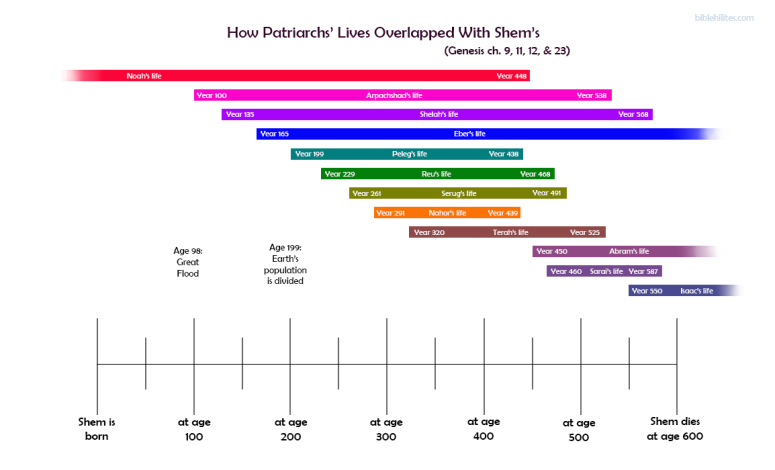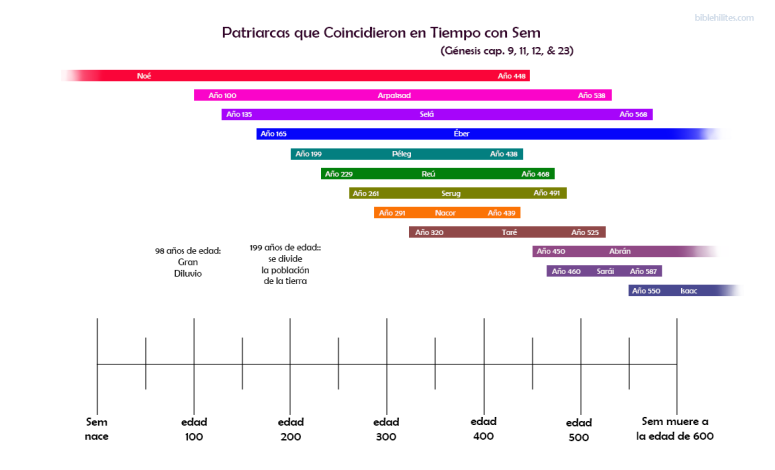
Isaac’s life overlapped with Shem’s, a survivor of the deluge, for fifty years. One can imagine how Shem might have strengthened Abraham’s and Isaac’s faith in Jehovah’s prophecies and power to save.

La vida de Isaac coincidió con la de Sem, sobreviviente del gran diluvio, por 50 años. Uno pudiera imaginarse cómo tal vez Sem fortaleció la fe de Abrahán e Isaac en las profecías y el poder salvador de Jehová.
Tag Archives: Bible
1 John, chapters 1-5
“If we accept the witness of men, the witness of God is greater. Because this is the witness God gives, the witness that he has given about his Son.”
~1 John 5:9
Living in the information age, we are constantly learning about new discoveries and ideas about how to live better.
We might assume, for the most part, that what we read or hear has at least some factual basis.
Likewise, when we first learned about Bible truths, we probably heard them from a person.
Regardless of what type of information we come upon, we would want to make sure it does not turn us into skeptical Bible students who start to doubt that it is the inspired Word of God.
While human knowledge in its many fields has a lot to offer, it does not compare with the infallible wisdom and hope offered by Jehovah and Jesus. (Num. 23:19)
1 Corinthians, chapters 15 & 16
“The glory of the sun is one sort, and the glory of the moon is another, and the glory of the stars is another; in fact, one star differs from another star in glory.”
~1 Corinthians 15:41
Bible writers did not have access to modern telescopes but they recognized the universe’s vast greatness escapes our understanding.
The Bible first mentions stars at Genesis 1:1: “In the beginning God created the heavens and the earth.”
It then mentions them more specifically at verse 16, when they became distinctly visible as light sources from earth.
The Hebrew word for “make” in this verse differs from the verb in verse one, which is to “create,” since the stars already existed when God was terraforming the earth.
Also, the Hebrew word for light in verse 16 is maohr, or “light source.”
The Bible compares the number of actual stars to something as innumerable as the grains of sand. (Heb. 11:12)
It also makes reference to the laws of physics which God has placed to keep stars in orbit. (Jud. 5:20; Job 38:31-33; Jer. 31:35,36)
The great power needed to conduct such an immense celestial orchestra should humbly move us to glorify our creator.
At the Griffith Observatory, there is an exhibit along a large gallery called “The Big Picture,” compiled from 2.46 gigapixels of telescope data.
Seeing the size of our own galaxy in relation to just a portion of our universe is one of the most mind blowing, humbling things I have ever experienced.
(Entry to the observatory is free).
1 Corinthians, chapter 13 & 14
“[…] In a congregation I would rather speak five words with my mind, that I might also instruct others, than ten thousand words in a tongue.”
~1 Corinthians 14:19
What was the purpose of Christians speaking in tongues and how do we know God discontinued the use of this miracle in his service?
Fifty days after Jesus’ resurrection, 120 of his Jewish disciples gathered together in Jerusalem to observe the Pentecost. (Acts 2:1-4)
They received through holy spirit the ability to communicate with Jews visiting from foreign countries.
Thus, many converted to Christianity. (Acts 2:5-11; 41-43)
This was one of nine gifts of the spirit early Christians relied on to help others learn the truth about Christ.(1 Cor. 12:7-11; Heb. 2:3,4)
But Bible prophecy states those gifts would cease. (1 Cor. 13:8)
When?
After Pentecost, Christians who continued to receive the gift of speaking in tongues were notably in the company of an apostle. (Acts 8:18; 10:44-46; 19:6)
It is to be understood then that after the last apostle’s death, these miraculous gifts would cease and the only way to identify God’s true congregation would be through its love. (John 13:35; 1 Cor. 13:13)
While modern Christians do not speak in tongues, we can still use our speech to build each other up. (1 Cor. 14:12)
(Last week there was no assigned Congregation reading corresponding to my personal study so I respectfully remind JW blog readers not to use these notes to prepare comments for this week’s meeting. Thank you.)
1 Corinthians, chapters 10-12
“Whoever eats the loaf or drinks the cup of the Lord unworthily will be guilty respecting the body and the blood of the Lord. […] But if we would discern what we ourselves are, we would not be judged.”
~1 Corinthians 11:27,31
The night of Friday, April 19, 2019 corresponds to the start of Nisan 14 on the Jewish calendar.
Jehovah’s Witnesses and friends will be gathering at meeting places around the world to commemorate what Jehovah and Jesus did for us on that day.
The night before his death, Jesus took unleavened bread and a cup of wine to establish a covenant between himself and those he was buying from the earth to become co-rulers with him in Heaven. (Matt. 26:26-29; Rev. 14:3-5)
God’s purpose for humankind has always been that we live forever in a paradise earth. (Gen. 1:28; Ps. 37:29)
But he has lovingly provided an arrangement wherein humans will be judged by peers who have proven faithful to righteous standards. (Rev. 20:6)
Jesus officially founded that arrangement when he shared his last evening meal with his faithful apostles.
How does a Christian know if they are entitled to share in the bread and wine emblems?
God’s spirit manifests itself to loyal individuals who know they are called to rule with Christ in heaven. (Rom. 8:15,16; 1 Thess. 2:12; 1 Pet. 1:3,4)
An anointed Christian experiences great inner change which leads him or her to be certain of his or her own future rather than to wonder about it. (John 3:5-8)
Because most of us are unfamiliar with how it feels to be born in the spirit, we do not judge our brothers who partake in the bread and wine.
Malachi, chapters 1-4
“[…] Jehovah kept paying attention and listening. And a book of remembrance was written before him for those fearing Jehovah and for those meditating on his name.”
~Malachi 3:16
We should not fear that God is so busy or we are so insignificant that he does not notice our day-to-day trials.
Jehovah wants us to know he does care.
He compassionately searches the earth for those who love righteousness, and if one dies, that person is safe in God’s memory until the resurrection. (Job 34:21; Ps. 56:8; Mal. 3:17; Acts 24:15)
Zechariah, chapters 9-14
“He must pass through the sea with distress;
And in the sea he will strike down the waves;
All the depths of the Nile will dry up.
The pride of Assyria will be brought down,
And the scepter of Egypt will depart.”
~Zechariah 10:11
When this prophecy was written, many centuries had passed since Jehovah had liberated the Israelites from Egypt or since Assyria as an empire posed a threat to his people.
In the past, God’s people had sometimes relied on alliances with those nations and placed their faith on their false gods instead of relying 100% on Jehovah.
Jehovah is telling his people that he will bring them back to true worship and free them from the false practices of neighboring nations.
Today, God’s people have also been freed from the practices of false religion and have found a safe way out of Satan’s world. (Is. 11:16)
Zephaniah, chapters 1-3
Even if we have made mistakes in the past which offended God, we can trust that if we sincerely repent, God will not remain angry at us forever. (Ps. 86:5)
Jehovah disciplined his people in ancient times to the point that it was fair and just, and he will do the same to us today if we fall into sinful practices. (2 Tim. 3:16)
So we should never fear that we are inevitably separated from God.
If he has forgiven us, we in turn have to forgive ourselves.
Micah, chapters 1-7
When we sin against God, we can recover spiritually not by our own merits, but by God’s own undeserved mercy.
We should not take a spiritual fall in such a way that we believe it is impossible to recover.
Certainly, if our spiritual standing depended solely on ourselves, then in our imperfection, we might never be faithful. (Ro. 3:23)
But because God reaches out to those repentant in order to draw them back close to him, we can trust that full spiritual recovery is possible. (Mic. 7:18,19)
To benefit from his help, we must show humility and patience. (Mic. 7:9)
Amos, chapters 1-9
“Even if you offer me whole burnt offerings and gift offerings,
I will find no pleasure in them; […]
Let justice flow down like waters,
And righteousness like an ever-flowing stream.”
~Amos 5:22, 24
We should not let our sacred service to God fall into a mechanical routine, as if we are doing him a favor through the sacrifices we offer him.
What God really looks for in us is heartfelt obedience. (Ps. 50:14)
False religion allows believers to continue on paths of cruelty and corruption, “absolving” sins through rites and rituals without ever addressing the root of problems. (Amos 2:6,7; 5:12)
Acceptable service to God is motivated by love of what is good.
We should try to reflect his sense of justice. (Amos 5:14,15)